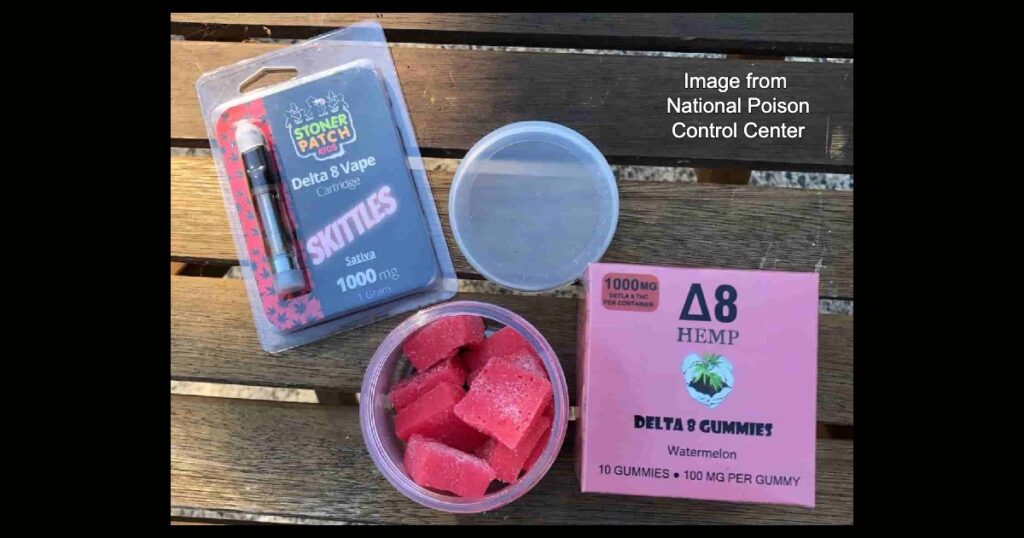Delta-8-THC, a hemp-derived compound sold as a “legal high,” has become a booming business in Florida and other states where legal access to marijuana remains limited. However, public health officials warn that product regulations are inadequate, potentially unsafe and that they are increasingly popular in communities where consumers have few legal cannabis options.
Unlike medical marijuana sold at licensed pharmacies, Delta 8 products are widely available at petrol stations, smoke shops and online retailers in Florida. They often come in colorful packaging with cartridges with gummy and steam, and are sold with little monitoring of potency, purity and labeling. The US Food and Drug Administration has determined that Delta 8 products are “generally not recognized as safe,” flagging reports of adverse effects ranging from hallucinations and vomiting to loss of consciousness. Regulators also warn that some products mimic popular candies and snacks, creating a risk of accidental intake by children.
A new study published in the American Journal of Preventive Medicine suggests that Florida’s legal grey zone promotes higher use of Delta-8 compared to states that either legalize marijuana completely or impose strict rules on hemp-derived cannabinoids. Researchers surveyed more than 1,500 US adults in the second half of 2023 and found that 7.7% (approximately 19 million) reported that they had tried Delta-8 at least once.
However, the use was not evenly distributed throughout the country. In states where recreational marijuana is prohibited, lifetime Delta 8 usage was twice as much as recreational states. In the banned states, 10.9% of adults reported using Delta-8, compared to just 5.5% in states with recreational cannabis laws. That pattern suggests that consumers will substitute delta-8 for marijuana if access to traditional cannabis is blocked.
Florida represents that trend. The state allows medical marijuana, but has repeatedly refused efforts to legalize recreational use. At the same time, we do not impose any restrictions on the sale of Delta-8. The study found that states with an unregulated Delta-8 market, such as Florida, reported the highest utilization rates in 10.5% of adults. In contrast, it states that it regulates Delta-8 products (restricting sales to pharmacies and setting up caps in effect) has dropped its lifetime usage to 3.9%. It said it had completely banned Delta-8 and reported a full 4.5%.

Public health experts say these differences are important. Delta-8 is chemically similar to Delta-9-THC, the main psychoactive ingredient in marijuana, but is often synthesized from hemp-derived CBD through chemical conversion. This process, if not carefully controlled, can produce by-products or contaminants, causing concerns about product safety. Without lab testing regulatory requirements, consumers in Florida and other unregulated states have little guarantees about what they are ingesting.
The authors of this study argue that “closing regulatory gaps” can reduce the use of unregulated Delta-8 products and limit exposure to potentially harmful compounds. “The findings suggest that when marijuana is restricted, people will instead rely on Delta 8 products,” the researchers wrote, warning that the ban may not curb demand as much as it redirects towards unregulated alternatives.
The discussion regarding Delta-8 is currently being developed in multiple ways. At the federal level, Congress is considering revising the 2024 Farm Bill, which limits total THC content to hemp-derived products and limits the production and sales of cannabinoids produced through chemical transformations such as Delta-8. The FDA and the Federal Trade Commission have issued warning letters to manufacturers to sell products designed to appeal to children or sold with misleading health claims.
For Florida lawmakers, the study highlights the complexities of cannabis regulations. By maintaining the ban on recreational marijuana while leaving Delta 8 unregulated, the state has created conditions that encourage the spread of ununderstood alternatives. Consumers looking for a legal alternative can easily find Delta-8 products in retail stores. In many cases, there is no age verification or safety test. Meanwhile, public health agencies continue to document an increase in emergency room visits and toxic control calls related to accidental or excessive intake of Delta-8.
The authors of this study concluded that stricter rules, such as regulations, pharmacy-only sales, or complete bans, are effective in suppressing use. However, rather than addressing a booming market of hemp-derived mental activity, Florida policymakers have so far focused on the debate on legalizing marijuana.
Until that changes, Floridians are most likely to encounter, buy or use Delta-8 products.


